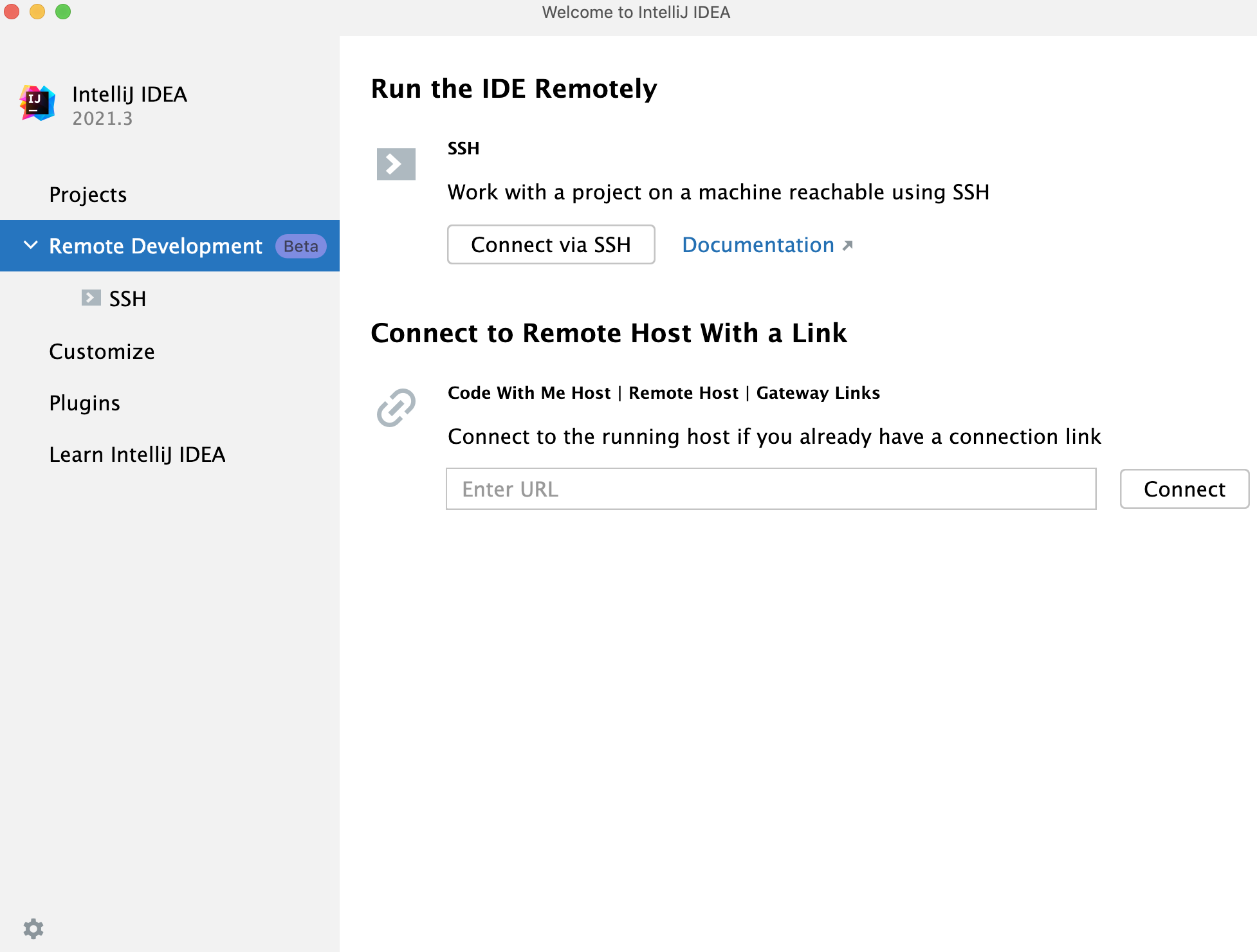Remote development
Since working remotely became a necessity, IntelliJ IDEA offers the Remote Development functionality to help you code, run, debug, and deploy your projects remotely.
Prerequisites
Before you start developing on the remote machine, make sure you have the following:
Remote machine (a target for an IDE) meets the minimum recommended requirements that can be found in IDEs articles.
You have installed a compatible SSH server on the Linux platform.
The Linux platform has any recent Linux AMD64 distribution such as Ubuntu 16.04+, RHEL/Centos 7+, and so on. There is no arm64 support yet. We recommend using machines with 2+ cores, 4GB+ of RAM, and 5GB+ of disk space.
You need to have the sftp subsystem enabled on the remote host. In the current implementation, we use it for the backend deployment.
Connection from IntelliJ IDEA
The connection to a remote sever is done via SSH and can be started right from the welcome screen of IntelliJ IDEA.

Connect to a remote server and open the remote project
On the IntelliJ IDEA welcome screen, select Remote Development.
In the Run the IDE Remotely section, click Connect via SSH.
If you have the IDE already running on the remote server and you have a connection link, you can use the Connect to Remote Host With a Link section.
Configure the remote server connection parameters and click Check Connection and Continue to make sure the connection to the remote server is successful.

On the next page of the wizard, in the IDE version field, select the source of the remote IDE that you want to use.
Use one of the following ways to get an IDE installer:
Automatically fetch from JetBrains installers storage -default variant.
Your remote server must have a network connection to JetBrains URLs:
https://code-with-me.jetbrains.com https://download.jetbrains.com https://download-cf.jetbrains.com https://cache-redirector.jetbrains.comFetch from your company's internal storage. In this case, you need to click Other options and select Use download link. It is helpful if remote machines don't have an Internet connection to JetBrains' websites or your organization uses some custom builds.
Upload from your local machine. In this case, click Other options and select Upload installer file. You need to get the IDE
.tar.gzarchive from the JetBrains website by yourself in advance.

Click Download and Start IDE.
IntelliJ IDEA starts JetBrains Gateway, which downloads the IDE backend, launches, and opens JetBrains Client with your project.
For the information on how to start working with a separate JetBrains Gateway installer, refer to JetBrains Gateway.
On how to add plugins, SDK, and work in an opened remote project, refer to the appropriate Getting Started section.
Licensing
JetBrains Gateway itself is a free application. However, you should have a license for the remote IDE.
The licensing for Remote Development is handled on the local machine and is covered by your existing active IDE license.
No license information is passed to or saved on the remote server. You can start the IDE backend without entering the license information since JetBrains Gateway is a free application.
The license will be checked later when you connect to the launched IDE backend. Product in the license on your local machine must match the remote backend IDE. If you use a corporate floating license server, that's your local (client) machine, which must be able to reach this server. In this context nothing is changed from the same local IntelliJ IDEA mechanism.
Useful links
For the information on how to configure the Remote Development environment and open your project, refer to Getting started with remote development.
If you want to see the detailed information about the Remote Development architecture and definitions, refer to Remote development overview and FAQ about remote development.
If you have encountered problems, contact the Remote Development support (support@jetbrains.com) or create an issue/report in our YouTrack